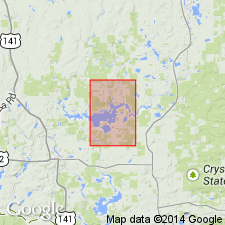
- Usage in publication:
-
- Hemlock formation*
- Modifications:
-
- Overview
- Redescribed
- AAPG geologic province:
-
- Lake Superior region
Summary:
Pg. 14 (table 2), 41-57, pl. 1. Hemlock formation of Baraga group (new) of Animikie series. Reinstated because "Hemlock greenstone" of Leith and others (1935, USGS Prof. Paper 184) is too restricted to include all its units. Consists mainly of a thick series of altered basic volcanic flow rocks, tuffs, and agglomerates, forming massive to schistose and slaty greenstone. Lithology varies in Kiernan quadrangle, eastern Iron County, Michigan (Lake Superior region); is predominately metabasalt in southwestern part, basic schist in northeastern part, and metarhyolite (including sericite slate) in southeastern part of quadrangle. Formation completely surrounds Amasa oval (uplift); general dip outward from core of uplift. Magnetic in places. Thickness ranges from about 2,300 feet on east side of oval to about 20,000 feet on west side of oval (in region including type locality). Underlies Fence River formation (new), or where Fence River is absent, underlies Michigamme slate; overlies Goodrich quartzite, or where Goodrich is absent, overlies Randville dolomite. Metamorphic grade increases northeastward across area from chlorite to biotite to garnet zone. Age is late middle Precambrian (upper Huronian); previously considered middle Huronian. Report includes geologic map, cross sections, magnetic profiles, petrographic data, chemical analyses.
Source: Publication; US geologic names lexicon (USGS Bull. 1200, p. 1730); supplemental information from GNU records (USGS DDS-6; Denver GNULEX).
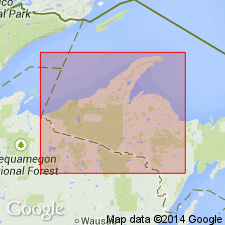
- Usage in publication:
-
- Hemlock formation*
- Modifications:
-
- Revised
- AAPG geologic province:
-
- Lake Superior region
Summary:
Pg. 30 (table 1), 36. Hemlock formation of Baraga group (new) of Animikie series. In northeastern Iron County, northwestern Michigan (Lake Superior region), includes Mansfield iron-bearing shale member near base and newly defined Bird iron-bearing member about 1,300 feet below top. Age is middle Precambrian (Animikie Series). Report includes stratigraphic sequence chart.
Source: US geologic names lexicon (USGS Bull. 1200, p. 1730); supplemental information from GNU records (USGS DDS-6; Denver GNULEX).
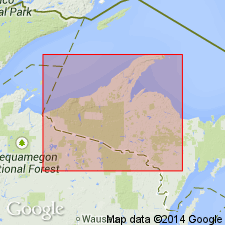
- Usage in publication:
-
- Hemlock Formation*
- Modifications:
-
- Overview
- AAPG geologic province:
-
- Lake Superior region
Summary:
Pg. 2845 (fig. 2, stratigraphic chart compiled from Leith and others, 1935; James, 1958; Gair and Thaden, 1968). Hemlock Formation of Baraga Group of Marquette Range Supergroup (new; replaces †Animikie series of James, 1958, south of Lake Superior, in Michigan and Wisconsin). Present in Iron River-Crystal Falls district, northwestern Michigan. Underlies Amasa Formation of Baraga Group. Age is middle Precambrian.
Source: Publication.
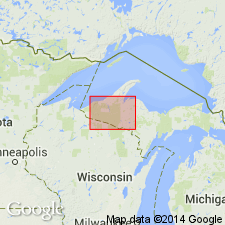
- Usage in publication:
-
- Hemlock Formation*
- Modifications:
-
- Revised
- AAPG geologic province:
-
- Lake Superior region
Summary:
Revised--taken out of Baraga Group and placed in Menominee Group of Marquette Range Supergroup, Iron River 2 deg quad, Lake Superior region. Mapped in western Marquette Range and Iron River-Crystal Falls area. Is considered equivalent to major iron-bearing units of Marquette and Gogebic Ranges. Overlain by Amasa Formation (revised), also reassigned to Menominee Group. Is mapped as six informal subunits that includes iron-formation. Overlies Negaunee Iron-formation. Is Early Proterozoic in age.
Source: GNU records (USGS DDS-6; Denver GNULEX).
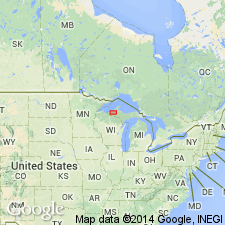
- Usage in publication:
-
- Hemlock Formation
- Modifications:
-
- Overview
- AAPG geologic province:
-
- Michigan basin
Summary:
Hemlock Formation of Baraga Group of Marquette Range Supergroup. In the Iron River-Crystal Falls district of Michigan, Baraga Group includes (ascending) Goodrich Quartzite (150 m), Hemlock Formation (1,830 m), Amasa Formation (550 m), Michigamme Formation (1,830 m), and Badwater Greenstone (4,570 m). [Cannon (1986) had removed Amasa, Fence River, and Hemlock Formations from the Baraga and reassigned them to the underlying Menominee Group.]
Source: GNU records (USGS DDS-6; Reston GNULEX).
For more information, please contact Nancy Stamm, Geologic Names Committee Secretary.
Asterisk (*) indicates published by U.S. Geological Survey authors.
"No current usage" (†) implies that a name has been abandoned or has fallen into disuse. Former usage and, if known, replacement name given in parentheses ( ).
Slash (/) indicates name conflicts with nomenclatural guidelines (CSN, 1933; ACSN, 1961, 1970; NACSN, 1983, 2005, 2021). May be explained within brackets ([ ]).

